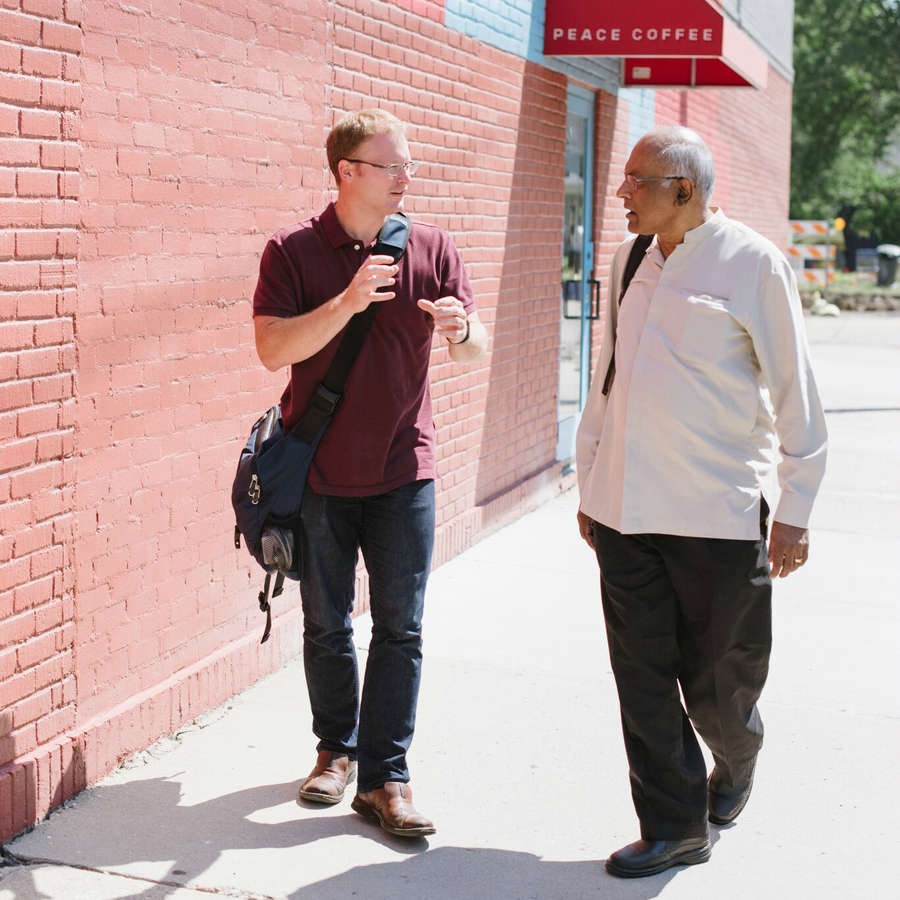
“This is my beloved Son, with whom I am well pleased.” –Matthew 3:17
The father is the fountain of the family’s joy. Where Daddy is winsomely happy — and happy enough to make the sacrifices necessary for the good of others — a happy family will follow in his wake.
Being a daddy is deeply bound up with joy. Is our joy contagious even to those who know us best and are around us at the most inconvenient times? Are we willing to sacrifice our own personal comforts for the joy of our wife? Will we establish and keep a family culture of contentment — a fellowship of joy — that our children genuinely enjoy?
Learn from the Sri Lankan
Many of us young fathers today would benefit from getting outside our bubbles and breathing some fresh cross-cultural air when it comes to fatherhood. We all have our blind spots and can be easily dragged down by the friction and fanfare of life in the West. What we desperately need more of is not newfangled tips and techniques, but a timeless, transcultural vision of what it means to be an earthly father under the wise and loving care of our heavenly Father.

Enter Ajith Fernando. He is an internationally known and loved Christian author and teacher, called “the Asian John Stott” by some. He was born in Sri Lanka (the island-nation off the southern coast of India), came to the United States for graduate studies, and returned to his native country, engulfed in conflict, and served for 35 years as the national director of Youth for Christ. Most of his career he has served in the perils, pains, and relentless frustrations of the Sri Lankan civil war that began in 1983 and lasted more than 25 years, until 2009.
Ajith is author of the award-winning A Call to Joy and Pain: Embracing Suffering in Your Ministry. Recently, Ajith came through Minneapolis, and I had the privilege of breathing in some fresh air on fathering over coffee with him.
The publication of his new book, The Family Life of a Christian Leader, was our catalyst to talk fatherhood.
Delight in Your Children — and Let Them Know It
One of the first bells Ajith rings for fathers of all ages — especially for young and aspiring daddies — is the tone of delight. It is a father’s responsibility, and privilege, to set the tone of joy in his household. A father will set the mood of his home, whether he tries to or not, whether he chooses to be present or absent. And a happy daddy is integral in creating a happy home. Rarely will a family’s ethos of joy rise above the father’s capacity.
But joy is not only significant as the general tenor of family life, but also as the specific expression of a father toward his children. Just as God himself voiced his delight over his Son, “This is my beloved Son, with whom I am well pleased” (Matthew 3:17), so God wired our children to hear from us, their human fathers, that we are pleased with them. It’s important for our kids to know not only that Daddy is happy, but that they are a real ingredient in our happiness.
Our voicing of our joy in our children, or lack thereof, is fundamental to the father-child relationship, but that doesn’t mean we dads do it naturally. However much we may be inclined in this direction, all of us need to learn, as Ajith says, to “proactively express your delight in your children.”
Break the Cycle of Silence
Expressing delight in his children did not come naturally for Ajith. “My father was a driven, hard-working person who was deeply committed to our welfare and sacrificed to secure a good future for us. It was part of Sri Lankan culture at that time that fathers didn’t have much warm conversation with their children. I had to learn to develop a different model.”

As Ajith came of age and saw other visions of parenting, and then became a father himself, he resolved to break the cycle of silence and learn not only to feel a father’s delight in his children, but to frequently express it. It was a habit that did not come easily, given his upbringing, but a discipline he felt compelled to cultivate, for the health of his children and family. And for his own soul.
Enjoy Your Father’s Delight
Yet you can’t consistently and convincingly express a delight that you don’t have. The first step, Ajith says, before expressing joy, is experiencing it — and the transcultural key to learning delight in one’s children is finding God’s own fatherly delight in us as his child. It’s one thing to hear and confess, but another thing to truly know and enjoy.
Ajith has discovered in decades of student ministry in Sri Lanka that a key aspect of the discipling process is coming to know that God really does love us. God truly delights in his children (Zephaniah 3:17; Psalm 147:11; 1 Peter 1:6–7; Romans 2:29; 1 Corinthians 4:5). In our sin, we’re all disposed, in some fashion, to try to earn God’s affection. We may profess verbally that he’s a loving Father, but deep down the reflex of our soul may be, like the “wicked and slothful servant” in the parable of the talents, to see him as “a hard man” (Matthew 25:24, 26).
In coming to know his heavenly Father’s specific love for and delight in him, Ajith was able to break the cycle and turn the corner to become the kind of father who expresses delight. Ajith’s charge to young fathers is not to drum up delight in your own strength or muster perfunctory words, but to first learn to enjoy the delight of your heavenly Father, and let God’s delight in you fill you to delight in your children.
“It is a decision we make as fathers: to express delight.”
Complete the Cycle of Joy
Learning to express our delight in our children to our children clearly cultivates their joy, and their mother’s joy, and the joyful tenor of our homes, but it also comes back around to Daddy and increases his joy. Consider the penetrating insight of C.S. Lewis about praise completing our joy with fatherhood in view:
We delight to praise what we enjoy because the praise not merely expresses but completes the enjoyment; it is its appointed consummation. It is not out of compliment that lovers keep on telling one another how beautiful they are; the delight is incomplete till it is expressed. (Reflections on the Psalms)
When a father not only knows his heavenly Father’s delight and feels delight in his children, but expresses his delight to them, he completes the cycle of joy. He makes his home a happier place — and himself a happier man — one affectionate articulation at a time.
Words Will Heal — and Hurt
The flip side, of course, is the destructive power of a father’s unkind words. It is remarkable how powerful his words can be in shaping a child for good, or for ill.
“We need to be very careful about the words we use at home. And that again is a discipline to learn. We learn not to say certain things by realizing how much they hurt our children or our spouse. Very often the way we heard our parents talking to each other is exactly what we do at home.
“Christian conversation is often a story of unlearning, so that we can be loving to the people we meet” — especially those in our own household.
Bring Back the Joy: Apologize
Every father sins with his mouth. No father has perfectly expressed his delight in his children to his children without uttering regrettable words in some tense moment of home life. So making home a happy place means we learn the art of apologizing. The father leads the way in whether a family is quick or slow, frequent or infrequent, in saying, “I’m sorry.”
“Until I apologize,” says Ajith, “I am a bad example to my family.”
As easy as it can be for a father to think of all sorts of excuses for why he shouldn’t humble himself and express regret, “For a Christian, apologizing should not be a big deal, because we get our identity from God — and that identity is a gift that has been given through grace.
“If our identity was in our performance, then apologizing would be a big deal. But our identify comes from grace. When we do wrong, grace is hindered, and we can’t live without grace. We can’t live without the smile of God.
“In order to restore the smile of God, we hasten to apologize.”
A father humbling himself to apologize to his children may be one of the single most important things you can do to transform a strained relationship with your child.

Truly knowing the delight of our heavenly Father renovates our perspective and practices as earthly fathers. If you want your wife and children to experience a happy home, lean on him and his love for you as you strive to become the fountain your family needs.




